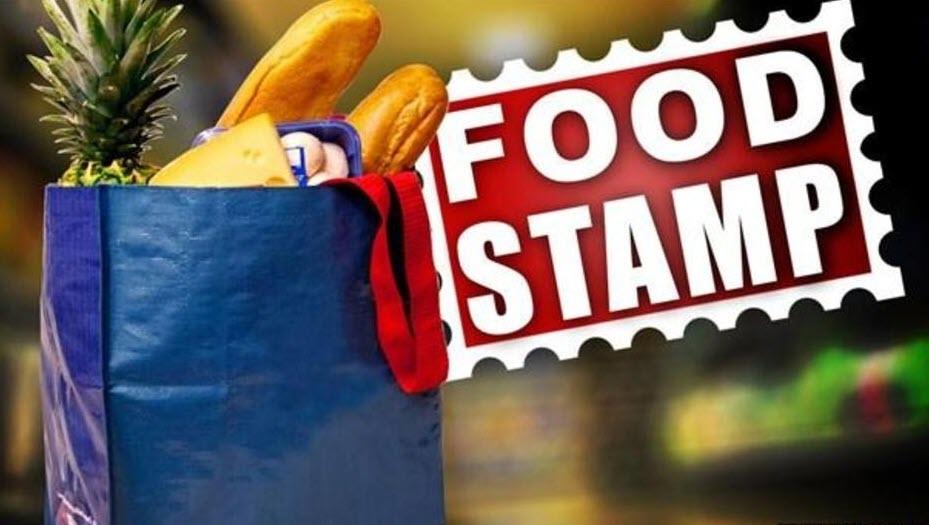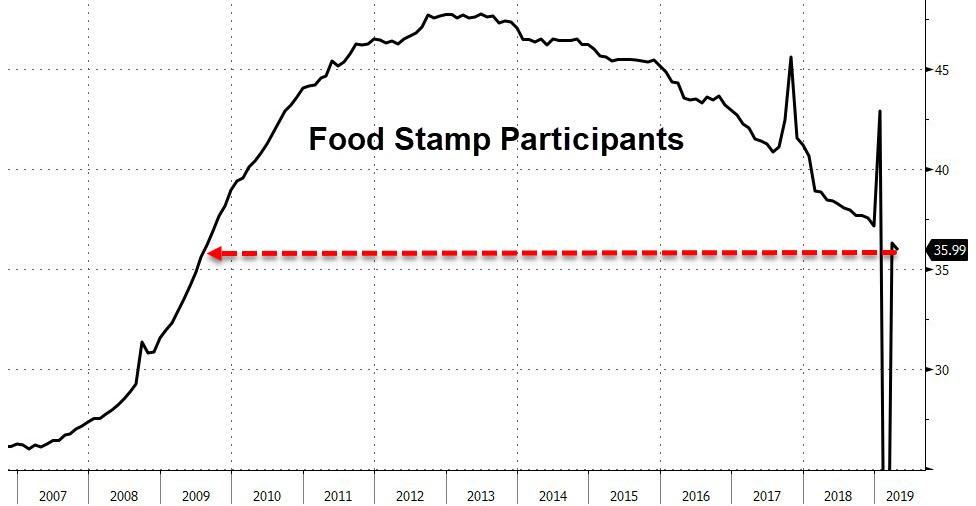Authored by Laurence Vance via The Future of Freedom Foundation,
Economists who say that there is no such thing as a free lunch are forgetting the Supplemental Nutrition Assistance Program (SNAP) and the National School Lunch Program (NSLP).
SNAP, formerly called the food stamp program, is administered by the Food and Nutrition Service (FNS) of the U.S. Department of Agriculture (USDA), but is operated by the 50 states. Although it began as a temporary program in 1939, it was made a permanent one as part of Lyndon Johnson’s vision of a “Great Society.”
SNAP “offers nutrition assistance to millions of eligible, low-income individuals and families and provides economic benefits to communities” and is “the largest program in the domestic hunger safety net.” Benefits differ by state. There is no limit as to how long one can receive benefits as long as there are children in the household, subject to renewal every six months. According to the FNS, in fiscal year 2018, the average monthly benefit was $126.32 per person and $252.55 per household. In fiscal year 2018, the program cost American taxpayers $65.055 billion.
[ZH: Food Stamp participation is at 10 year lows]
Recipients of SNAP benefits receive a deposit on an electronic benefit transfer (EBT) card each month that can be used only for prepackaged food items. To receive benefits, a family’s gross monthly income must be at or below 130 percent of the federal poverty line. Net monthly income must generally be less than or equal to the poverty line. Government payments from other welfare programs are not counted when determining income. Able-bodied adults have minimal work requirements.
The NSLP is a federally assisted meal program that operates in more than 100,000 public and nonprofit private schools and residential child-care institutions. Although it began in 1946, it was expanded in 1966, also as part of Johnson’s Great Society. In fiscal year 2018, the program cost American taxpayers $13.8 billion.
The NSLP provides free or low-cost lunches to more than 31 million children each school day. It is administered on the federal level by the FNS of the USDA. On the state level, the NSLP is administered by state education agencies, which operate the program through agreements with school food authorities. Participating school districts receive cash subsidies and USDA Foods for each reimbursable meal they serve.
Children may be determined “categorically eligible” for free meals through participation in certain federal assistance programs, such as SNAP or Head Start. Children can also qualify for certain programs on the basis of household income and family size. The children in a family having an income at or below 130 percent of the poverty level are also eligible for free meals. An income between 130 percent and 185 percent of the poverty level means that schools may not charge students more than 40 cents for a reduced price lunch.
SNAP and the NSLP were recently reauthorized, with overwhelming Republican support, as part of the Agriculture Improvement Act of 2018 (H.R.2).
Conservatives have recently criticized both programs. But their critiques ring hollow. They are worth looking at, however, because they show that conservatives are utterly devoid of any firm philosophical base on which to ground their criticisms of these or any other government programs. Only libertarians are able to properly analyze these programs.
Conservatives want to eliminate the “broad-based categorical eligibility” that allows food stamp applicants to bypass asset tests. Bypassing asset tests means that a food stamp recipient may have millions of dollars in assets, but still receive benefits if his income is low enough. The USDA is considering a regulation that would eliminate the broad-based policy. At a recent hearing of the House Agriculture Committee’s nutrition, oversight, and department operations panel, the subcommittee’s ranking member, Rep. Dusty Johnson (R-S.D.) termed the loophole “egregious and unnecessary.” Johnson referenced a USDA report that estimated that “most food stamp income-eligible homes have financial resources that exceed the federal limit of $20,000 in assets,” “one in five had more than $100,000 in assets,” and “tens of thousands had more than $1 million in assets.” Conservatives also regularly talk about the need to expand the food stamp work requirements.
Conservatives are pointing out the waste and fraud in the NSLP. According to the Office of Management and Budget, the NSLP “lost nearly $800 million owing to improper payments in fiscal year 2018.” Conservatives want to eliminate the “Community Eligibility Provision” that “allows schools, districts, and even groups of schools located in the same area where 40% of student enrollment is eligible for federal assistance (such as food stamps) to offer free meals to all students.” It turns out that middle- and upper-income students are receiving free meals that they normally are not entitled to. “Congress and the White House should eliminate this provision and focus resources on helping children in need, as recommended in Heritage’s ‘Blueprint for Balance,’” says Jonathan Butcher, a senior policy analyst in The Heritage Foundation’s Center for Education Policy. (The Heritage Foundation is a conservative think tank.)
Conservatives generally focus on the waste, fraud, loopholes, and inefficiencies in these and other federal programs and rarely, if ever, make the case that it is not the proper role of government to feed anyone. They have no philosophical objection to any government program as long as it is run efficiently, doesn’t waste taxpayer dollars, or furthers some agenda of theirs.
But conservatism is actually worse than it seems. Even if a conservative personally supports the federal government’s efforts to provide a hunger safety net, make sure that low-income families have enough food to eat for dinner every night, and feed children lunch at school, he should still oppose the federal government’s food stamp and school lunch programs.
Conservatives claim to revere and follow the Constitution. Yet, SNAP and the NSLP are blatantly unconstitutional.
The Constitution nowhere authorizes the federal government to have anything to do with food, nutrition, breakfast, lunch, dinner, supper, hunger, or food safety nets.
The Constitution nowhere authorizes the federal government to have SNAP, the NSLP, the Agriculture Improvement Act, the FNS, or the USDA.
At the very least, conservatives should be calling for the total and complete elimination of those actions, programs, and agencies on the federal level and their continuance on the state level. But, apparently, federalism means no more to conservatives than the Constitution does.
When it comes to SNAP, the NSLP, or any other food program of the U.S. government, libertarianism says three things:
-
It is not the proper role of government to feed the hungry or subsidize the purchase of food by low-income families.
-
Transferring wealth from one American to another — whether it takes the form of a deposit on an EBT card or a hot lunch at school, and even if the recipient is hungry — is immoral.
-
Charity should be private and voluntary, not public and forced.
There is such a thing as a free lunch. And you can count on conservatives to make sure of it.
via ZeroHedge News https://ift.tt/2XwnWl8 Tyler Durden

